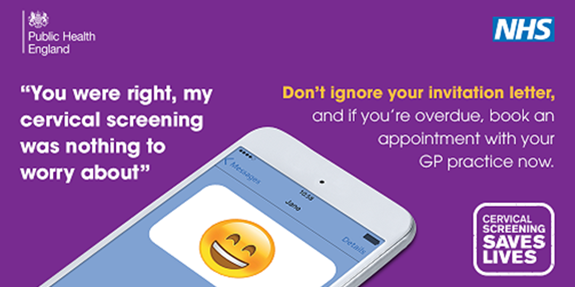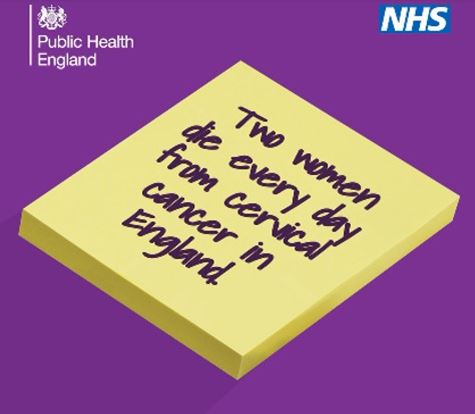Cervical Screening
Why the NHS offers cervical screening.
We offer cervical screening to check the health of your cervix and help prevent cervical cancer. We look for high-risk human papillomavirus (HPV). This is because it can cause abnormal changes that may lead to cervical cancer.
Finding and treating any changes early can prevent most cases of cervical cancer. Cervical cancer mostly affects women and people who have a cervix under the age of 45, but abnormal changes can happen at any age.
Cervical screening saves thousands of lives each year in the UK.
Regular cervical screening is important. You’re still at risk of cervical cancer even if you:
- have had the HPV vaccine
- have only had 1 sexual partner
- haven’t had penetrative sex
- have had the same partner, or have not had sex, for a long time
- are a lesbian or bisexual
- are a trans man or a non-binary person with a cervix
- have had a subtotal (partial) hysterectomy that did not remove your cervix
If you’ve had a total hysterectomy, you do not have a womb or cervix. This means you do not need cervical screening.
For more information, read 'Your Guide to NHS Cervical Screening' here Your guide to NHS cervical screening - GOV.UK
To view this information in another language visit Alternative Formats - Your guide to NHS cervical screening - GOV.UK
Symptoms of Cervical Cancer
Often there are no symptoms. However, see your GP if you notice:
- Bleeding after sex
- Bleeding between periods
- Bleeding after the menopause
- Heavy discharge
- Pain during sex
Most cases of cervical cancer are caused by the Human Papilloma Virus (HPV) and can be largely prevented by:
- The HPV vaccine which is offered to girls aged between 12-13 and can reduce the risk of cervical cancer by 70%
- Having regular smear tests
Who will be invited for cervical screening.
NHS England routinely invite women aged 25 to 64 every 5 years. Most cervical cancers develop between these ages.
Your GP surgery gives us your contact information. Please make sure they have the correct details, including your:
- name
- date of birth
- address
- mobile number
- email address
Your invitation will give you information about booking cervical screening. You can book as soon as you’re invited.
Trans men and non-binary people with a cervix are also eligible for cervical screening. How you’re invited will depend on how your gender is recorded in your GP patient record:
- If you’re listed as female, you’ll receive invitations automatically.
- If not, you can “opt in” to receive routine invitations. You can do this by contacting a cervical screening provider, such as your GP, a sexual health clinic or a transgender health clinic.
If you’re unsure, contact your GP. Find more information on screening for transgender and non-binary people..
What to expect at my appointment
What will happen
Cervical screening involves taking a small sample of cells from your cervix for testing. It's usually done by a female nurse or doctor, who will explain the test and answer any questions you have before they start.
How cervical screening is done
- You'll need to undress, behind a screen, from the waist down. You'll be given a sheet to put over you.
- The nurse or doctor will ask you to lie back on a bed, usually with your legs bent, feet together and knees apart. Sometimes you may need to change position during the test.
- They'll gently put a smooth, tube-shaped tool (a speculum) into your vagina. A small amount of lubricant may be used.
- The nurse or doctor will open the speculum so they can see your cervix.
- Using a soft brush, they'll take a small sample of cells from your cervix.
- The nurse or doctor will close and remove the speculum and leave you to get dressed.
The cervical screening test itself should take less than 5 minutes. The whole appointment should take about 10 minutes.
If you feel you might need extra emotional support at your appointment, please complete this form and bring it with you to your appointment - Extra Support Form
What will happen after?
Your results will come to you in the post 2-4 weeks later. If you need any further tests the appointment will be booked directly for you. Of 100 women who have screening, 6 have abnormal cells, and 4 go on to have a further test called colposcopy. Please visit www.nhs.uk/colposcopy for further information on this procedure.
Results
From September, NHS plans to start sending results from the NHS Cervical Screening Programme, utilising the NHS App.
In September, those who have a negative test result will be notified of this by an NHS App message. It will also appear as an NHS App notification. If the NHS App message isn’t read within 72 hours, a letter will be sent as a failsafe.
Abnormal result letters will continue for the time being to be delivered by post.
This change follows the successful rollout of digital invitations and reminders in June 2025, where since the launch, 9 out of every 10 invitations are being sent digitally, with the remainder being sent by post.
Cervical screening: support for people who feel anxious about attending
This information is for women and people with a cervix who find it difficult to attend cervical screening.
You may feel understandably anxious or worried about attending, this could be for many reasons and may include:
- a mental health condition
- previous cervical screening experience(s)
- previous traumatic experience(s)
- sexual and/or domestic violence
- dysphoria
This information talks about what support is available if you are worried, feel anxious or think it may be painful when attending your cervical screening. You can use this information to help decide whether to attend and to find support to make it easier for you if you would like it.
For more detailed information visit Cervical screening: support for people who feel anxious about attending - GOV.UK

Cervical Screening For People With a Learning Disability
Smear tests are happening and you may get a letter inviting you to go. We know you may find smear tests confusing or worrying, but you are not alone if you feel this way. You may want a friend, carer, or learning disability nurse to read it with you.
For a guide to what happens at your smear test, please click here.
Why younger women don't have screening
Cervical cancer is very rare in women younger than 25. But changes in the cells of the cervix are quite common in this age group. These changes often return to normal and are less likely to develop into cancer. So screening them leads to unnecessary treatment and worry.
Researchers have worked out that screening younger women leads to more harms than benefits.
The following websites can provide you with further information about why Cervical Screening is so important.
Specialist clinics for cervical screening
There are specialist clinics available for people who may feel uncomfortable going for cervical screening.
CliniQ are a holistic sexual health and well being service for all trans people, partners and friends. They are a trans-led team, who offer a safe, confidential space for those who may not feel comfortable accessing mainstream services. They provide a cervical screening service.
My Body Back Project is a specialist service that run clinics where women who have experienced sexual assault are able to access cervical screening. All the female staff are trained to work with women who have experienced sexual violence.
Page created: 21 July 2021

